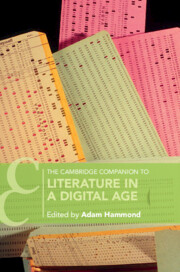Book contents
- The Cambridge Companion to Literature in a Digital Age
- The Cambridge Companion to Literature in a Digital Age
- Copyright page
- Contents
- Figures
- Contributors
- Chronology
- Introduction
- Chapter 1 Literary Data
- Chapter 2 Literary Change
- Chapter 3 The Canon
- Chapter 4 Voice and Performance
- Chapter 5 The Archive
- Chapter 6 Editions
- Chapter 7 Materiality
- Chapter 8 The Literary Marketplace
- Chapter 9 Fanfiction, Digital Platforms, and Social Reading
- Chapter 10 Narrative and Interactivity
- Chapter 11 Generated Literature
- Chapter 12 Literary Gaming
- Chapter 13 The Printed Book in the Digital Age
- Chapter 14 Literature’s Audioptic Platform
- Chapter 15 Critique
- Index
- Cambridge Companions To Literature
Chapter 12 - Literary Gaming
Published online by Cambridge University Press: 29 November 2024
- The Cambridge Companion to Literature in a Digital Age
- The Cambridge Companion to Literature in a Digital Age
- Copyright page
- Contents
- Figures
- Contributors
- Chronology
- Introduction
- Chapter 1 Literary Data
- Chapter 2 Literary Change
- Chapter 3 The Canon
- Chapter 4 Voice and Performance
- Chapter 5 The Archive
- Chapter 6 Editions
- Chapter 7 Materiality
- Chapter 8 The Literary Marketplace
- Chapter 9 Fanfiction, Digital Platforms, and Social Reading
- Chapter 10 Narrative and Interactivity
- Chapter 11 Generated Literature
- Chapter 12 Literary Gaming
- Chapter 13 The Printed Book in the Digital Age
- Chapter 14 Literature’s Audioptic Platform
- Chapter 15 Critique
- Index
- Cambridge Companions To Literature
Summary
Videogames once seemed like they would have a part to play in the future of the book – the natural evolution of literary practice onto more expressly interactive digital platforms. Today, despite numerous compelling examples of videogames that support literary engagement, the comparison can seem strange, clichéd, banal, and beside the point. This chapter attempts to reset the comparison of videogames and literature for the present moment of digital culture. First, it presents a brief history of critical perspectives on videogames as literature. Second, it reflects on the contemporary status of and challenges to videogaming’s literary aspirations following recent shifts in the industry’s design priorities and monetization practices. This chapter does not present an argument regarding the status of games as literature. Rather, its goal is to describe the urgent work of literary studies in continuing to rethink digital gaming in the unfolding digital age.
Keywords
- Type
- Chapter
- Information
- The Cambridge Companion to Literature in a Digital Age , pp. 212 - 232Publisher: Cambridge University PressPrint publication year: 2024

